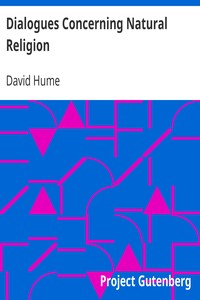Dialogues Concerning Natural Religion by David Hume
"Dialogues Concerning Natural Religion" by David Hume is a philosophical work published in 1779. Three philosophers—Demea, Philo, and Cleanthes—debate God's existence, nature, and whether humans can truly know the divine. While all agree God exists, they clash over fundamental questions: Can design in nature prove God's existence? Does the world contain more suffering or good? Through their arguments, Hume explores the limits of human reason in understanding the divine, offering critiques that
would influence religious and scientific thought for centuries. (This is an automatically generated summary.)
Read or download for free
| Reading Options | Url | Size | |||
|---|---|---|---|---|---|
| Read now! | https://www.gutenberg.org/ebooks/4583.html.images | 245 kB | |||
| EPUB3 (E-readers incl. Send-to-Kindle) | https://www.gutenberg.org/ebooks/4583.epub3.images | 171 kB | |||
| EPUB (older E-readers) | https://www.gutenberg.org/ebooks/4583.epub.images | 174 kB | |||
| EPUB (no images, older E-readers) | https://www.gutenberg.org/ebooks/4583.epub.noimages | 154 kB | |||
| Kindle | https://www.gutenberg.org/ebooks/4583.kf8.images | 311 kB | |||
| older Kindles | https://www.gutenberg.org/ebooks/4583.kindle.images | 300 kB | |||
| Plain Text UTF-8 | https://www.gutenberg.org/ebooks/4583.txt.utf-8 | 231 kB | |||
| Download HTML (zip) | https://www.gutenberg.org/cache/epub/4583/pg4583-h.zip | 169 kB | |||
| There may be more files related to this item. | |||||
Similar Books
About this eBook
| Author | Hume, David, 1711-1776 |
|---|---|
| Title | Dialogues Concerning Natural Religion |
| Note | Wikipedia page about this book: en.wikipedia.org/wiki/Dialogues_Concerning_Natural_Religion |
| Credits | Produced by Col Choat. HTML version by Al Haines. |
| Reading Level | Reading ease score: 50.0 (College-level). Difficult to read. |
| Language | English |
| LoC Class | B: Philosophy, Psychology, Religion |
| Subject | Natural theology -- Early works to 1800 |
| Subject | Religion -- Early works to 1800 |
| Category | Text |
| EBook-No. | 4583 |
| Release Date | Oct 1, 2003 |
| Most Recently Updated | Dec 28, 2020 |
| Copyright Status | Public domain in the USA. |
| Downloads | 2029 downloads in the last 30 days. |
| Project Gutenberg eBooks are always free! | |

